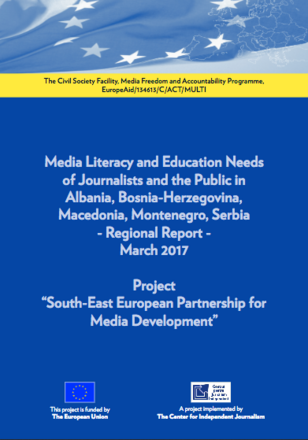
In the context of worsening conditions for the journalistic profession, how does journalism education tackle the challenges of this profession in the digital environment? Is the public properly address in terms of media literacy education?
These are the questions addressed in this regional report published by SEE Media Partnership for Media Development in March 2017.
The research explores education needs in journalism and for the general public, offering an overview of the environmental factors at the basis of media literacy in the countries of South East Europe.
A first challenge identified in the report is the difficulty media industry and educators face in the region in creating structured and sustainable partnerships, to properly address new knowledge and practical skills market requirements. “In all countries researched, education systems are not keeping up with the changes and technology advancements of the media industry”, a trend which is made even more worrying as in some of the countries scrutinized in the report “journalism studies” are being transformed into “communication studies”. “Education systems in the region – the report explains - “seem to aim at producing communicators, who may fit a wide range of positions, from journalists, to PRs, speakers, marketing professionals etc.” As a consequence, the overall quality of journalism deteriorates year after year.”
As far as the legal framework is concerned, “media literacy is barely mentioned in country legislations and strategies”, the report points out, adding that “in all the researched countries, various laws and documents point to media literacy […] however, the issue with media literacy as part of education and knowledge of the general public is not approached in a systematic and structured manner in any of the countries in the region.”
There are sporadic efforts and isolated initiatives to introduce elements of media literacy education in schools, high schools and universities.
In such complex environmental landscape, civil society organizations (CSOs) and donors are taking a key role in powering the discussion about media literacy, in promoting high-quality journalism ethics and standards, in sourcing and teaching new knowledge and skills required by the industry.
Tags: Media literacy Albania Bosnia Herzegovina North Macedonia Montenegro SerbiaThe content of this article can be used according to the terms of Creative Commons: Attribution-NonCommercial 4.0 International (CC BY-NC 4.0) . To do so use the the wording "this article was originally published on the Resource Centre on Media Freedom in Europe" including a direct active link to the original article page.

